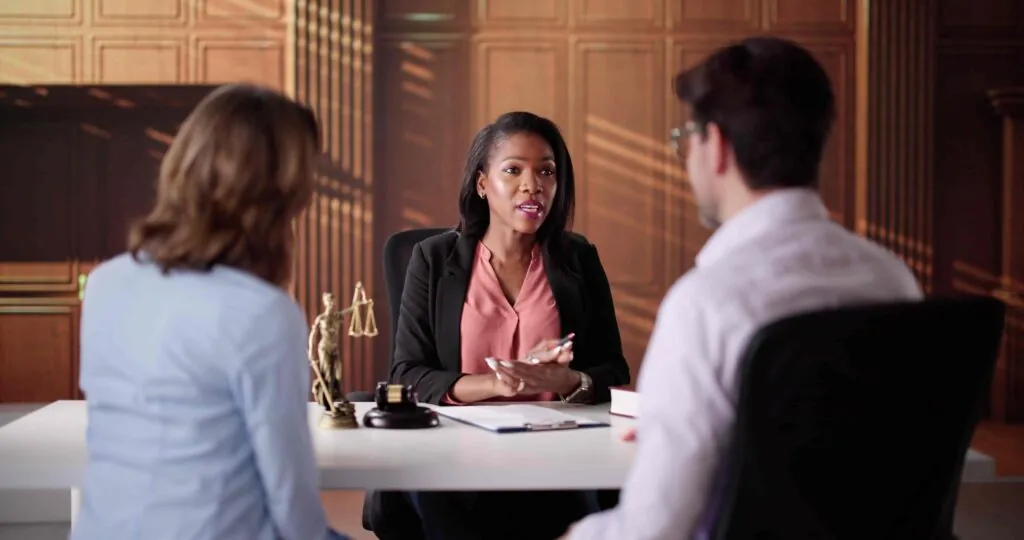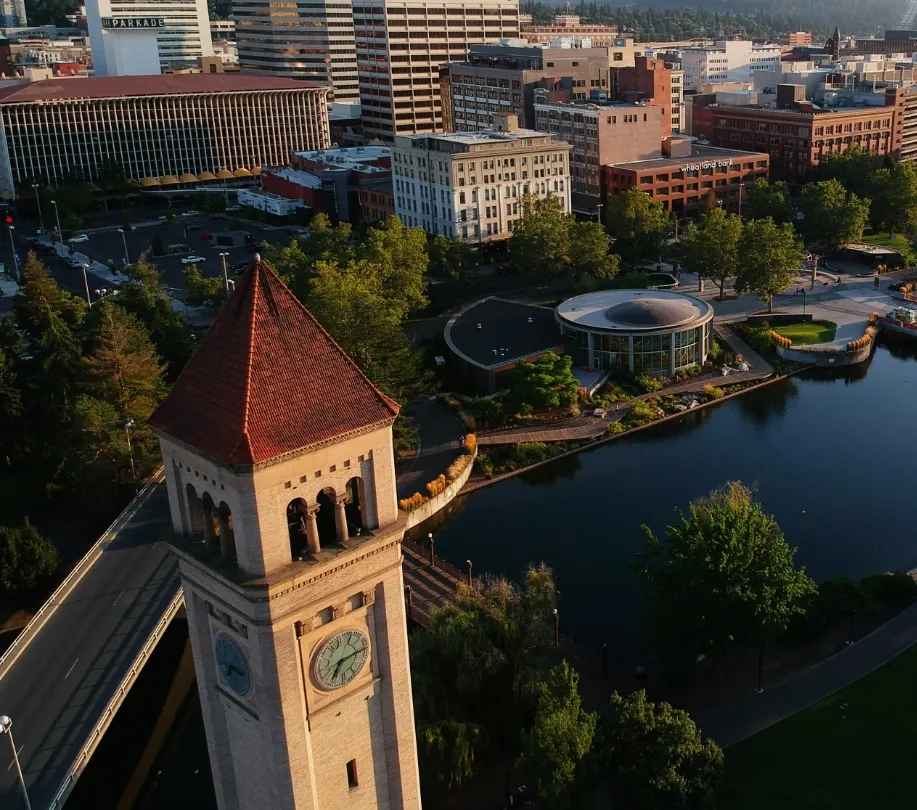Dealing with a family law matter can feel like trying to find your way through a dense forest without a map. The path forward seems uncertain, and the emotional toll can be heavy. You want to find a resolution that protects your family, your finances, and your future, but the idea of a courtroom battle can be stressful.
Fortunately, there is another way. Mediation offers a constructive, private, and often more peaceful path to resolving disputes. A knowledgeable Coeur d’Alene mediation lawyer can be the guide you need to navigate this process with confidence and care.
At Crouse Erickson, we are dedicated to helping families in Coeur d’Alene and throughout Kootenai County find effective, lasting solutions. If you are facing a divorce, custody dispute, or another family law issue, we are here to help you explore your options and advocate for your best interests.
Contact Us Today For A Consultation
Key Takeaways: Coeur d’Alene Family Law Mediation
- Mediation is a confidential, non-adversarial process where a neutral third party helps participants negotiate a settlement.
- In Idaho, courts often require parties in family law cases, especially those involving children, to attempt mediation before proceeding to a trial.
- A personal mediation attorney acts as a client’s advocate, providing guidance and protecting their rights throughout the process.
- Mediation allows families to create customized agreements on issues like child custody, asset division, and child support that a court might not be able to order.
- Agreements reached in mediation can be formalized into legally binding court orders, providing the same enforceability as a judge’s ruling.
- The process is generally less expensive and time-consuming than traditional litigation.
Why Choose a Coeur d’Alene Mediation Attorney from Crouse Erickson?
When you choose to work with Crouse Erickson for your family law mediation, you are choosing a team that is deeply committed to your success. Our practice is built on a foundation of intense preparation and a client-first philosophy. We understand that while mediation is a cooperative process, you still need a strong advocate in your corner. Our attorneys bring a comprehensive understanding of Idaho family law to every case, helping you prepare for negotiations, understand your rights, and make informed decisions.
We believe the best outcomes are achieved when clients feel supported and empowered. That’s why we take the time to listen to your story, understand your goals, and develop a strategy tailored to your unique circumstances. While we are always prepared to litigate forcefully if necessary, we find that a well-prepared, strategic approach to mediation often yields the most favorable and durable results for families.
Some key aspects of our approach include:
- Exclusive Family Law Focus: Our firm practices family law exclusively. This focus allows us to maintain an intricate knowledge of the laws and court procedures specific to Kootenai County.
- Meticulous Preparation: We believe success is born from hard work. We put in the long hours required to analyze every detail of your case, from complex financial documents in high-asset divorces to the nuances of co-parenting plans.
- Strategic Advocacy: We help you define your non-negotiables and areas for compromise before you even enter the mediation room, ensuring you negotiate from a position of strength and clarity.
Our team is dedicated to providing high-quality work that helps you move forward with confidence, knowing your interests were diligently protected throughout the process.
What is Family Law Mediation?
Family law mediation is a structured negotiation process designed to help people resolve disagreements outside of court. Think of it less like a courtroom showdown and more like a guided conversation in a private conference room. In this process, a neutral third-party, called a mediator, helps facilitate a discussion between you and the other party (and your respective attorneys).
The mediator’s job is not to make decisions or take sides. Instead, they are trained to:
- Help both parties communicate more effectively.
- Identify the key issues that need to be resolved.
- Encourage the exploration of creative, mutually agreeable solutions.
It’s important to understand that the mediator cannot provide legal advice to either person. Their role is to remain impartial and guide the process. This is why having your own mediation lawyer is so important—your attorney is there to be your personal advocate, ensuring you understand the legal implications of any proposed agreement and that your rights are protected every step of the way. In many Kootenai County family law cases, a judge will require the parties to try mediation before they can schedule a final trial, as outlined in the Idaho Rules of Family Law Procedure 602.
This emphasis on alternative dispute resolution reflects a belief that families are often best equipped to make decisions about their own futures, rather than leaving those deeply personal choices in the hands of a judge.
What Are the Benefits of Mediation vs. Litigation?
Choosing between mediation and litigation (going to court) is a significant decision. While a trial is sometimes unavoidable, mediation offers several powerful advantages that make it the preferred path for many families in the Coeur d’Alene area. It provides a forum to resolve disputes respectfully, which can be especially beneficial for those who will need to co-parent for years to come.
- You Control the Outcome: In litigation, a judge who knows very little about your family makes the final, binding decisions about your life, your children, and your property. In mediation, you and the other party have the final say. You work together to craft an agreement that you both can live with, which often leads to greater satisfaction and better compliance down the road.
- It is Confidential: Court hearings and documents are part of the public record. Anyone can walk into a courtroom or, in some cases, look up the details of your divorce online. Mediation is completely private. All discussions and negotiations are confidential, as protected by Idaho Rules of Family Law Procedure 604. This allows for open and honest conversation without fear that your personal or financial details will become public knowledge.
- It Can Be More Cost-Effective: A court battle can be incredibly expensive. The costs of preparing for trial, including attorney’s fees, expert witness fees, and court costs, can quickly add up. While mediation is not free, resolving your case in a few sessions is almost always significantly less expensive than a prolonged legal fight.
- It Fosters Better Communication: The adversarial nature of litigation can destroy any remaining goodwill between parties. Mediation, on the other hand, is designed to be cooperative. It encourages respectful communication and problem-solving, which are invaluable skills for co-parents who will need to interact for many years regarding their children.
- It Allows for Creative Solutions: Judges are bound by specific legal rules and can only order certain outcomes. In mediation, you can be much more creative. For example, you can create unique parenting time schedules that accommodate your family’s specific needs, or you can devise novel ways to divide property that a judge might not be able to order.
These benefits provide families with the tools to build a stable foundation for the future, even as their family structure changes.
What Issues Can Be Addressed in Coeur d’Alene Family Law Mediation?
Mediation is a versatile tool that can be used to resolve nearly any issue that arises in a family law case. It is particularly effective for complex situations, such as those involving high-value assets or intricate custody arrangements. At Crouse Erickson, an attorney from our team can provide the guidance you need to address these and other important matters.
Common topics addressed in Idaho family law mediation include:
- Divorce and Legal Separation: This includes resolving all aspects of ending a marriage, from the division of property and debt to determining if spousal support (alimony) is appropriate.
- High-Asset Property Division: For couples with significant assets like businesses, real estate holdings, or complex investments, mediation provides a confidential setting to work with financial neutrals and devise a fair and equitable division.
- Child Custody and Parenting Plans: This is one of the most common uses for mediation. Parents can work together to create a detailed parenting plan that outlines decision-making authority (legal custody) and a schedule for when the children will be with each parent (physical custody), as described under Idaho Statutes Title 32, Chapter 7.
- Child Support: Parents can negotiate child support amounts, who will provide health insurance for the children, and how to divide costs for things like extracurricular activities and uncovered medical expenses.
- Modifications of Existing Orders: Life changes. If a parent’s income changes significantly or a child’s needs evolve, mediation is an excellent way to modify existing child custody or child support orders without a new court battle.
- Parental Relocation: If one parent wants to move a significant distance with the children, mediation can help parents negotiate a new custody arrangement that preserves the other parent’s relationship with the children.
Essentially, any dispute that could be decided by a judge can first be addressed in mediation, giving you the power to find a personalized and practical solution.
The Mediation Process in Idaho
While every case is unique, a typical family law mediation in Coeur d’Alene follows a general framework. Your attorney will be with you at every stage, providing advice and support.
- Selecting a Mediator: You and the other party can agree on a mediator you both trust. If you cannot agree, the court may appoint one for you from a list of qualified professionals. An experienced family law attorney will have a good understanding of the local mediators and can help you choose one whose style is a good fit for your case.
- Preparing for the Session: This is where our firm’s commitment to intense preparation truly shines. Before the mediation session, your lawyer will work with you to gather all necessary financial documents, clarify your goals and priorities, and develop a negotiation strategy. We help you understand the potential outcomes if you were to go to court, which gives you a realistic baseline for negotiations.
- The Mediation Session: Sessions are often held at the mediator’s office. You may begin in the same room with the other party to allow the mediator to explain the process. Often, you will then move to separate rooms (a process called “caucusing”). The mediator will go back and forth between the rooms, listening to your concerns, relaying proposals, and helping to bridge the gap between you. Your attorney will be with you in your room to provide confidential advice throughout this process.
- Reaching an Agreement: If you and the other party are able to find common ground on all issues, the mediator (or one of the attorneys) will draft a formal settlement agreement. This document will detail all the terms you have agreed upon.
- Finalizing the Court Order: Your attorney will carefully review the written agreement to ensure it accurately reflects your understanding and protects your legal rights. Once signed, the agreement is submitted to the court. A judge will review it to ensure it meets legal standards (especially regarding children) and, upon approval, will sign it into a legally binding and enforceable court order.
This structured yet flexible process allows for careful consideration and negotiation, aimed at reaching a conclusion that everyone can move forward with.
The Crucial Role of a Mediation Attorney
A common misconception is that if you are using a mediator, you don’t need an attorney. This could not be further from the truth. The mediator must remain neutral and is prohibited from giving legal advice or advocating for either side. Your attorney is the only person in the room whose sole responsibility is to protect your interests.
A skilled Coeur d’Alene mediation lawyer from Crouse Erickson will play several critical roles:
- Educator and Advisor: We will explain how Idaho law applies to your specific situation so you understand your rights and obligations regarding property division, custody, and support.
- Strategic Planner: Before mediation, we help you identify your goals, anticipate potential points of conflict, and develop a clear negotiation strategy. This preparation prevents you from making emotional decisions in the heat of the moment.
- Advocate and Negotiator: During the session, we advocate on your behalf, articulating your position clearly and persuasively. We can help you reality-test proposals and brainstorm creative solutions that you might not have considered.
- Legal Protector: We ensure that any final agreement is legally sound, fair, and comprehensive. We look for potential pitfalls or ambiguities in the language that could cause problems later on, protecting you from an agreement that is unworkable or not in your long-term best interests.
Attempting to navigate mediation without your own legal counsel can leave you vulnerable. Having a dedicated advocate by your side provides peace of mind and is a vital investment in securing a fair outcome and a stable future.
Coeur d’Alene Family Law Mediation FAQs
Here are some answers to common questions we receive about the mediation process in Idaho.
What happens if we can’t reach a full agreement in mediation?
Mediation is not an all-or-nothing process. It is considered successful even if you only resolve some of your issues. For any issues that remain unresolved after mediation, your case will simply proceed toward litigation, and a judge will make the final decision on those specific matters at a hearing or trial.
How long does a typical mediation session last?
The length of mediation can vary greatly depending on the complexity of the issues and the willingness of the parties to compromise. Some cases can be resolved in a single half-day or full-day session. More complex cases, especially those involving high-value assets or contentious custody disputes, may require multiple sessions spread out over several weeks.
Is a mediated agreement legally enforceable?
An agreement reached in mediation is a contract between the two parties. However, to make it fully enforceable as a court order, it must be submitted to and approved by a judge. Once the judge signs the agreement and incorporates it into a final decree or order, it carries the same legal weight as any other court order and can be enforced through the court system if one party fails to comply.
Can we go to mediation after our divorce is already finalized?
Yes, mediation is an excellent tool for post-divorce disputes. Former spouses often use mediation to resolve issues that arise later, such as the need to modify a child support order due to a job change or to adjust a parenting plan as children get older and their needs change. It is a much more collaborative and cost-effective way to handle these modifications than filing motions and going back to court.
Let Our Experienced Coeur d’Alene Mediation Lawyers Assist You
Choosing the right path to resolve your family law matter is one of the most important decisions you will make. At Crouse Erickson, we are committed to providing the supportive guidance and principled advocacy you need to navigate the mediation process effectively.
We have seen firsthand how mediation can empower individuals to close a difficult chapter and begin a new one with clarity and confidence. Whether you are contemplating a divorce or need to modify an existing custody agreement, we are here to help you build a brighter future for yourself and your family.
To discuss your case with a trusted Couer d’Alene family law attorney, please call our office at (208) 618-8910 or fill out our online form to schedule a consultation.








